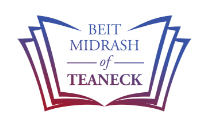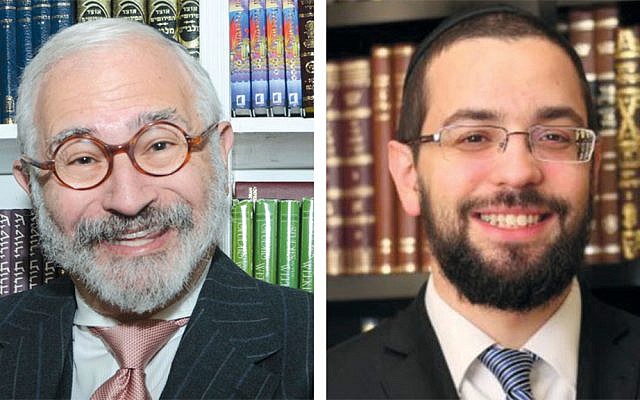This article was originally published in the Jewish Standard.
Come study Torah. It’s good for you.
That’s part of the pitch that Leonard Grunstein of Teaneck makes for the new Teaneck Beit Midrash, or study hall, aimed at retired people and open only to men, that will meet on Mondays and Wednesdays at the Jewish Center of Teaneck. (On Sunday, to highlight the program, Rabbi Ari Berman, the president of Yeshiva University, will headline a yom iyyun, or Torah study day, at the Jewish Center. See box.)
The pitch goes like this: One of the most important tasks of retirement is preparing a social network. “It’s the lack of a social network that makes retirement a failure,” Mr. Grunstein says, citing an article he read in Fortune Magazine 20 years ago on how to have a successful retirement. And then there’s the role that intellectual stimulations plays in warding off dementia and Alzheimer’s disease.
“There was a 30-year longitudinal study that looked at an age-restricted community that had almost no incidents of Alzheimer’s or dementia,” Mr. Grunstein said. “They allowed their brains to be autopsied. They found that they had all the physical manifestations in their brains of Alzheimer’s — the tangles, the knots. But the symptoms didn’t occur. The thing that was unique about the community was that there was a great deal of intellectual engagement in a social setting. They had book clubs, they played bridge.”
They probably did not study Talmud. And talmudists tend not to have their brains dissected posthumously. But the principle would seem to apply.
The Teaneck Beit Midrash is an Orthodox institution. Mr. Grunstein is a member of Congregation Bnai Yeshurun. His colleagues on the committee that founded it include members of other Teaneck Orthodox synagogues. The program is being run in conjunction with the Orthodox Union, Yeshiva University, and Heichal Hatorah, the Orthodox yeshiva high school that owns the Teaneck Jewish Center building.
But a key spark to the program took place at Congregation Beth Sholom, Teaneck’s Conservative congregation. Mr. Grunstein was there for a study program the congregation held together with neighboring Orthodox Rinat Yisrael.
“It was magnificent,” he said. “There were 180 people. Everyone had a source sheet in front of them. We divided up into groups of six to 10 people, with a moderator directing the discussion. It was thrilling. A social and intellectually engaging experience.
“This is a way to energize people because sitting in a lecture — I notice all too often that people my age” — Mr. Grunstein is 66 — “tend to fall asleep unless they’re personally engaged.
His experience at the program reminded him of his experience as a young man in yeshiva. “The best part was sitting in the beit midrash preparing” for the class, rather than the lecture that followed, he said.
The Teaneck Beit Midrash will start at 9:15 a.m. with the men dividing up into groups and preparing for the lesson with source sheets in Hebrew and Aramaic, and translated into English. Moderators will help with the discussions.
At 10, Rabbi Ronen Dvash, who teaches at Heichal Hatorah, will give a 45-minute Talmud class. This will be followed by a class on a topic in Jewish law or philosophy. “We’ll be drawing from all the departments of Yeshiva University to staff that part of the program,” Mr. Grunstein said. After that, Rabbi Hayyim Angel will give a class on the Bible, starting with the seldom studied Book of Nechemiah.
Add Mincha, the afternoon prayers, and the program should wrap up around 1 p.m.
In the future, once the beit midrash has achieved a critical mass, “hopefully we will have afternoon chesed programs, whether its visiting the sick in the hospital or mentoring,” Mr. Grunstein said.
Another of the program’s goals is to include programming for women. Mr. Grunstein said the decision to hold single-sex classes reflected the desires of the people he spoke to about the program in the Orthodox community — both men and women.
“It goes to the comfort level and age of the people and maybe their own cultural experience,” he said. “It comes down to respecting sensitivities.”
Mr. Grunstein said he hopes the beit midrash will become like a clubhouse, a place where people will want to go to spend time.
“One of the hardest things when you’re a retiree is you suddenly have no place that you regularly go to,” he said. “Work is an intensely engaging, immersive experience. When you retire you don’t have that. Maybe people join a golf club when they move to Florida, but it’s not the same.”
As a retiree, Mr. Grunstein spent two years studying Talmud at Yeshiva University. He found that study to be as engaging as work, and hopes the Teaneck beit midrash will replicate the experience.
“The Socratic method is part of the charm,” he said. “When the rebbe calls on you asks you to read that Gemara, and say what you think it means — you have to be engaged. All too often we have these extraordinary lecturers who are recording themselves and not engaging with the audience. The concept of the Teaneck beit midrash is to replicate the yeshiva experience and with source sheets prepare everyone so they can participate. We have to create an environment for people of uneven skills or whose skills have to be refreshed.”
Would-be students can come by the Jewish Center and “just drop in.” But Mr. Grunstein would appreciate an advance email reservation, at grunsteinl@gmail.com, so he knows how many chairs to set out and how many source sheets to copy. So far the response has been encouraging, with 70 men saying they will come and 40 joining a WhatsApp group dedicated to the program. Beyond Teaneck, “People are coming from Fair Lawn, Fort Lee, Englewood, even as far away as Riverdale.”
What: Yom Iyun to launch the Beit Midrash of Teaneck program
Who: Rabbis Ari Berman, Herschel Schachter, and Ari Weiss
When: Sunday, October 21, 11 a.m.
Where: Jewish Center of Teaneck, 70 Sterling Place, Teaneck
How to RSVP: Email grunsteinl@gmail.com

